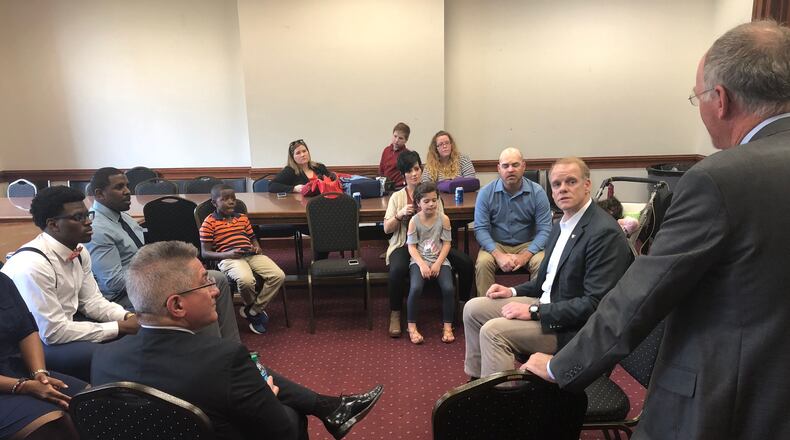Republican Clay Tippins sat at the end of a semi-circle, surrounded by about a half-dozen parents of children who rely on cannabis oil to treat debilitating illnesses.
The first-time candidate differs with his rivals in the governor’s race on contentious issues like “religious liberty” legislation and the escalating costs at Plant Vogtle’s nuclear reactors. But his campaign is highlighting his stance on cannabis oil as one of the sharpest dividing lines in the GOP race.
Of the five leading Republican candidates, he’s one of two who support significantly expanding the medical marijuana program. State Rep. Allen Peake, who authored the law that launched the program, calls Tippins the only “viable” contender to back it – a knock at state Sen. Michael Williams.
Both Democratic candidates, former House Minority Leader Stacey Abrams and ex-state Rep. Stacey Evans, also support expanding the program.
Tippins met with the families in a quiet room Tuesday on the second floor of the state Capitol, peppering them with questions about how they access the drug.
It’s illegal to cultivate marijuana in Georgia, which means families must rely on benefactors or trek to states that have legalized the drug for medical purposes. That makes travel a tricky prospect, since federal law bans transporting the drug across state lines and bars possessing it.
Gov. Nathan Deal opposes legislation allowing marijuana to be grown in the state, saying it should be up to Congress to tackle the debate. Lt. Gov. Casey Cagle, Secretary of State Brian Kemp and former state Sen. Hunter Hill all have similar stances.
Tippins hasn’t said specifically what he would do to expand the program, though when pressed Tuesday he said he was open to in-state cultivation.
“We’ve started down this path. We said you can possess this, you can use this, it’s good for you,” he said. “We’re going to make it accessible, and take a get-it-done, whatever it takes approach. We’re the best people in the planet in solving problems. And we can solve this one.”
He added: “I’ll do what it takes. If that includes cultivation, it does.”
Tippins' position could be troublesome in a Republican primary. Though polls show the overwhelming majority of Georgia voters support an expansion, the position could turn off conservative voters who worry it could lead to legalization of recreational marijuana. It also could risk alienating law-and-order groups who oppose the expansion.
Among the parents at the roundtable was Sydney Gayle, who brought her 5-year-old son Apollo to the discussion. Apollo suffers from a rare epileptic syndrome treated only by cannabis oil, and his mother asked that voters consider her son’s illness when weighing the debate at the ballot box.
“We need a change in Georgia. The rest of the country – even the most conservative states – are taking care of their people. And we believe there are good people in our Capitol who are doing the same,” said Gayle. “This isn’t about politics. It’s about being human and doing what’s right.”
Tippins said he initially balked at supporting an expansion over “slippery slope” concerns but changed his stance after meeting family members. His stance has echoed throughout the industry: He’s received tens of thousands in contributions from donors tied to medical marijuana firms.
Sitting on the edge of his seat, Tippins appeared emotional as each parent talked about their difficulties in accessing the drug, and frustrations that state lawmakers have balked at making sweeping changes to the program.
Near the end of the discussion, Peake posed a question: “What would I do if this were my child?”
Said Tippins: “Anything.”
The candidate left the parents with a pledge.
“I’m sorry that your journey has been harder than it has to be,” he said. “If I win, I’m going to fix this.”
About the Author
The Latest
Featured





